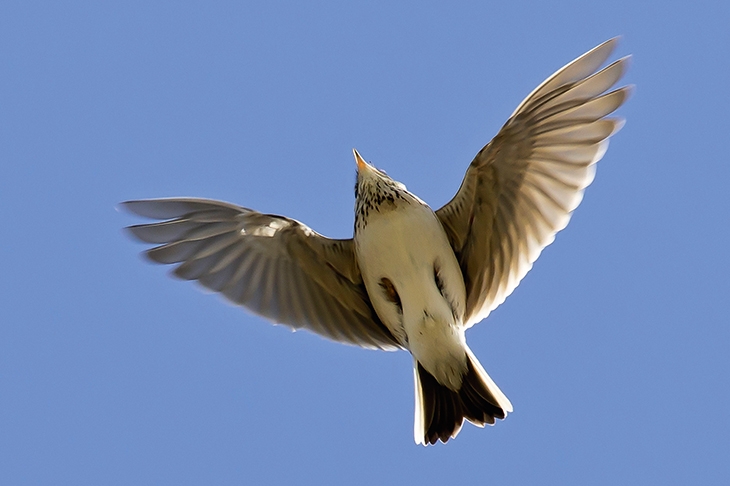Whether it’s Coleridge’s nightingale or Petrarch’s, Ted Hughes’s wren or Shelley’s skylark, Helen Macdonald’s hawk or Max Porter’s crow, literature is measured out in warbles and wingbeats — metaphors that have long since broken free of their originals, birds made not of sinew and bone but ‘ink and sentiment’. Richard Smyth’s A Sweet, Wild Note brings these black and white creatures back into colour, gives them science and geography, acoustics and ecology as well as poetry, bringing all these disciplines to bear on one question: what do we really hear when we hear birds sing?
Birdsong is to ornithology as that lump in your throat when you hear Barber’s Adagio is to musicology, or Proust’s madeleine is to cookery. The sum of parts doesn’t even come close. There’s an episode in A Sweet, Wild Note where Smyth visits Leeds University to dissect a partridge. He finds ‘a hollow nub of gristle, no bigger than a broad bean’ – the syrinx, a bird’s dual voice-box, source of all that sound and sentiment. His book is an attempt to fill in the gulf between that and the birdsong we create in our art and our imaginations, ‘the places where birdsong and human culture overlap’.
A self-confessed ‘birdsong sceptic’, Smyth is no zealot. A keen birdwatcher (rather, crucially, than a ‘birder’ or ‘twitcher’, whose monomaniacal passion he views as ‘somewhere between an alternative lifestyle choice and an untreated neurosis’), he’s a guide with a lively sense of the absurd, a wryly precise prose style and an appropriately magpie-like curiosity for his subject. There’s a wonderful democracy of reference to a book that draws on Radiohead and The Simpsons as well as Messiaen and Duchamp; that considers East End bird-catching alongside the Romantics and current bioacoustics research. Smyth even pauses to assess the likelihood of actually hearing a nightingale in Berkeley Square (slim to none).
He roams widely through the cultural and social history of birds and their songs, gently debunking myths as he goes. One particularly persistent one is the Englishness of the skylark, its indelible association with long summer afternoons and honey for tea. But this nostalgic nationalism is an invented past. Skylarks, as it turns out, are no more English than St George or the monarchy. Even Shelley’s ‘blithe Spirit’ was an Italian impostor, heard somewhere near Livorno, not in an English country lane. But Smyth’s ear for metaphor and symbol is as keen as his ear for song, and he’s quick to reassure that you can still have a skylark or nightingale moment, even if what you really heard was a robin.
The uniquely evanescent quality of birdsong is both a source of fascination and a challenge to man. The danger, as Smyth identifies it, is that the closer we listen to it, the more we hear only ourselves — our emotions, narratives and preoccupations — mirrored back at us. Even the notion that this ‘wildly unstable element’ is music is absurd, a rationalising and simplifying Smyth compares to ‘seeing faces in the shapes of clouds’.
If we truly wish to understand it, we have first to capture it: record it, transcribe it or describe it. The mechanics of the first two processes are fascinatingly exposed: the top secret, second world war code-breaking technology that was repurposed to help map birdsong in sonographs; the complex notation systems devised in order to try to transform a moment into a measurable quantity; the 18th-century’s mechanical bird imitations. But it’s in description that Smyth’s subject matter really comes alive. Goldfinches clink ‘like a pocketful of pound coins’; jays express themselves in ‘B-movie screams’; a turtle-dove croons ‘like a soft, woolly power-drill’; and sparrows sound like ‘a Commons debate wound up in pitch to a half-dozen kilohertz’. Smyth has taught himself to hear, and it’s impossible to read his vivid account and not listen just a little closer yourself.
But listening is a task that’s getting harder and harder, as a sober final chapter reminds us. Birds sing not for joy or exultation, as the poets would have us believe, but for immensely practical reasons. They need to advertise for a mate, mark their territory or warn other birds of danger. With modern cities ever larger and noisier, dwindling woodland and drained wetlands, these processes are inhibited. Some birds adapt (apparently the dawn chorus near Berlin’s Tegel Airport is rescheduled according to take-off times) or simply sing louder, but others cannot. Between 1995 and 2013 the UK skylark population fell by a startling 24 per cent, and it’s by no means an isolated statistic.
We might now have an app to identify birdsong, but if we look for one to create it we’re still no wiser than Hans Christian Andersen’s emperor, who attempted to replace a nightingale with a gilded mechanical imitation.






Comments